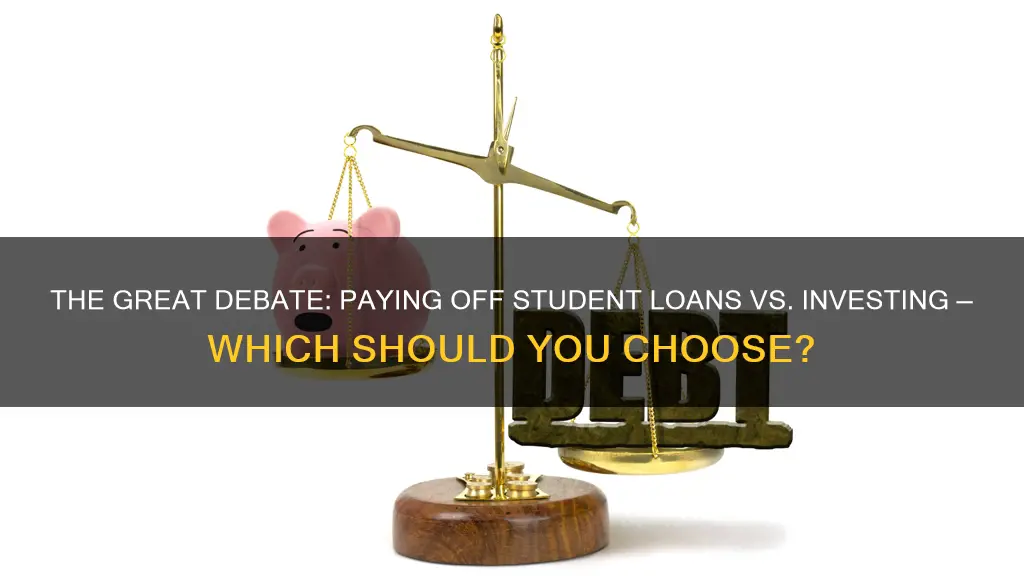
Whether to pay off student loans or invest depends on your financial goals and priorities. If you want to be debt-free quickly, putting your extra money toward removing student debt is ideal. However, investing could be a better option if your expected rate of return is higher than your student loan's interest rate or if you want to work on your financial security. You could also choose to do both.
Before deciding, it is important to first create a budget and build an emergency fund. It is also recommended to save at least one month's expenses. Over time, try to build up to three to six months' worth of expenses.
| Characteristics | Values |
|---|---|
| Interest rates | Compare the interest rate on your loans with the interest rate on your investments. |
| Tax deductions | You can deduct up to $2,500 of your student loan interest when you prepare your taxes. |
| Forgiveness programs | Federal student loans may be eligible for forgiveness programs. |
| Personal financial goals | Decide whether you want to be debt-free faster or build wealth for the future. |
| Type of student loan | Federal student loans offer benefits such as IDR plans, deferment, and loan forgiveness. |
What You'll Learn
- Compare the interest rates on your student loans with the expected returns on your investments
- Consider the impact of interest rates on student loans compared to potential investment returns
- Evaluate the benefits and drawbacks of paying down federal student loans versus private student loans
- Weigh the pros and cons of paying off your student loans early
- Assess your financial goals and priorities, such as becoming debt-free or building wealth for the future

Compare the interest rates on your student loans with the expected returns on your investments
When deciding whether to pay off student loans or invest, it is important to compare the interest rates on your student loans with the expected returns on your investments.
Student loan interest rates determine the cost of your debt, while the interest rate on investments impacts how much you might earn. If the average return on investment is higher than your student loan interest rates, investing instead of paying off your student loans may be the better option.
Federal student loans tend to have lower interest rates than private loans and come with benefits like Public Service Loan Forgiveness. For the 2024-25 school year, the federal student loan interest rate for undergraduates is 6.53%. Private student loan interest rates can sometimes be lower than federal rates, but approval for the lowest rates requires excellent credit.
A conservative but plausible return on investments is 6% per year. If your student loan interest rates are higher than that, you’d likely save more money by paying them off and avoiding interest charges. On the other hand, if your student loan interest rates are less than 6%, investing extra money toward retirement or a brokerage account may be more beneficial in the long term.
It is also worth noting that federal student loan interest rates are fixed, while private student loans can have either fixed or variable interest rates. Variable interest rates can change over time, so while they may start out low, they can increase significantly.
Local Superfund Sites: Worthy Investment Opportunities
You may want to see also

Consider the impact of interest rates on student loans compared to potential investment returns
When deciding whether to pay off student loans or invest, it is important to consider the interest rates on student loans compared to the potential returns on investments.
Student loan interest rates vary depending on the type of loan. Federal student loans tend to have lower interest rates than private loans, ranging from 1% to 13%. Private student loans often have higher interest rates, which can be as high as 14.24%. By paying off student loans early, individuals can reduce the amount of interest paid over time. However, it is essential to weigh the benefits of paying off federal or private student loans separately, as they offer different terms, benefits, and programs.
On the other hand, investing early and consistently can lead to potential returns that outweigh the interest paid on student loans. For example, the long-term average annual return of the S&P 500 is about 10%, which is more than twice the rate of some student loans. Additionally, investing in a 401(k) or an individual retirement account (IRA) offers tax advantages that can help encourage setting money aside for retirement.
Ultimately, the decision to pay off student loans or invest depends on an individual's financial goals, risk tolerance, and comfort with debt. Some people may choose to put portions of their discretionary income toward both investing and paying down student debt. It is crucial to understand one's financial situation and seek professional advice when needed.
Green Energy's Golden Promise: Worth the Investment?
You may want to see also

Evaluate the benefits and drawbacks of paying down federal student loans versus private student loans
Paying off student loans early can be a smart move, but it's important to consider the opportunity cost of doing so. While it can help you save money by avoiding interest and lower your debt-to-income ratio, it may not be the best decision if you don't have an emergency fund, are taking advantage of tax benefits, or are utilising federal loan repayment options.
When comparing federal student loans with private student loans, there are several benefits and drawbacks to consider.
Federal Student Loans:
Benefits:
- Often offer more flexible repayment options
- Fixed interest rates
- Lower interest rates compared to private loans
- Don't require a credit history or a co-signer, making them more accessible to borrowers
- Provide income-driven repayment plans and loan forgiveness options, which are not usually available with private loans
- Can be discharged in cases of death or total and permanent disability
Drawbacks:
- No subsidized loans for graduate students
- Borrowers who default cannot escape by declaring bankruptcy
- Undergraduates who are claimed as dependents on a tax return cannot borrow as much as independents
- Not available for all schools
- Multiple applications are required for each year of study
Private Student Loans:
Benefits:
- May offer higher borrowing limits
- Potentially lower interest rates for borrowers with good credit scores
- Faster application process
- Open to borrowers who don't qualify for federal loans, such as international students or those who have reached the maximum federal borrowing limit
- Interest payments of up to $2,500 per year may be tax-deductible
Drawbacks:
- Usually don't offer income-driven repayment plans or loan forgiveness options
- Generally not dischargeable in bankruptcy and may persist after the borrower's death
- Often require a good credit score or a co-signer
- Higher risk of overborrowing
- Interest rates may be variable, leading to higher monthly payments if interest rates rise
Markets: The Freeze
You may want to see also

Weigh the pros and cons of paying off your student loans early
There are several pros and cons to paying off your student loans early. Here are some of the most important ones to consider:
Pros:
- Lower interest payments: Paying off your student loans early will reduce the amount of interest that accrues over the life of your loan. This can result in significant savings and is often the biggest benefit of paying off your student debt early.
- Improved cash flow: Once you have paid off your loan, you will no longer have to make monthly payments, which frees up money for daily expenses, investing, or saving for retirement.
- Lower debt-to-income ratio: A lower debt-to-income ratio makes it easier to get approved for other types of credit, such as mortgages and car loans. It also increases your chances of getting a lower interest rate on new loans.
- Peace of mind: Clearing all your debt can bring a sense of relief and freedom, knowing that whatever money you earn is yours to spend as you wish.
Cons:
- Higher interest rates on future loans: Student loans tend to have lower interest rates than other private loans. If you pay off your low-interest student loans early and then borrow money for another purpose, you will likely pay a much higher interest rate on the new loan. In this case, early repayment of your student loan could result in a net loss.
- Loss of tax advantages: Interest on student loans is often tax-deductible, but there may be limits to how much you can deduct each year. Paying off your student loan early could mean giving up this tax advantage.
- Impact on emergency fund: Paying off your student loans early could drain your emergency fund or prevent you from building one. It is generally recommended to prioritize saving for unexpected expenses over making extra payments on your student loan.
Ultimately, the decision to pay off your student loans early depends on your individual financial situation and goals. It is important to consider factors such as your monthly cash flow, interest rates on your loans, tax advantages, and the impact on your savings and investment plans.
Investing in People: Debt as an Asset
You may want to see also

Assess your financial goals and priorities, such as becoming debt-free or building wealth for the future
Before deciding whether to pay off your student loans or invest, it is important to assess your financial goals and priorities. Do you want to become debt-free faster or build wealth for the future?
If you want to become debt-free, you can pay off your student loans early. This will help you save money in interest and become debt-free sooner. It will also improve your debt-to-income ratio (DTI), making it easier to qualify for a mortgage. However, paying off your student loans early may not be beneficial if you are working towards loan forgiveness or repayment assistance. Additionally, you may miss out on building wealth by not investing.
On the other hand, if you want to build wealth, you can invest. Investing can help you build wealth earlier and potentially retire earlier. It can also help you take advantage of an employer match and maximize tax deductions. However, investing comes with risks, and you may lose money.
Ultimately, the decision to pay off student loans or invest depends on your financial goals and priorities. You may also choose to do both by budgeting portions of your discretionary income for each.
Why People Avoid Investing
You may want to see also
Frequently asked questions
The answer depends on your financial situation and risk tolerance. If you prefer specific investment advice, consider contacting a Certified Financial Planner (CFP).
While the answer depends on your unique situation, it’s generally a good idea to avoid high-risk assets, like cryptocurrency.
Whether you should make contributions to your retirement account while repaying student loans depends on your financial circumstances. If you can afford to invest and pay down student debt at the same time, doing so may be a smart idea. However, if contributing to your retirement account puts you at risk of defaulting on your loan, consider prioritizing repaying your loans.
Pros
- Pay less in total interest
- Peace of mind from paying off debt
- Better ability to reach other financial goals
Cons
- Opportunity cost with money that's not invested
- Missing out on potential debt cancellation benefits
Pros
- Potential for higher returns over time
- Start building wealth immediately, with the potential to retire earlier
- Might be able to take advantage of an employer match
Cons
- Returns might not always be sufficient
- There's a risk of loss of principal when you invest







